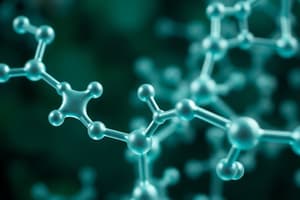Podcast
Questions and Answers
What is the nitrogen content in proteins?
What is the nitrogen content in proteins?
- Around 10% of the molecular weight
- Around 16% of the molecular weight (correct)
- Around 5% of the molecular weight
- Around 25% of the molecular weight
Why did Berzelius suggest the term 'proteins' for these substances?
Why did Berzelius suggest the term 'proteins' for these substances?
- Because he thought them to be most important of biological substances (correct)
- Because of their high nitrogen content
- Because they could be coagulated on heating
- Because they were primarily found in milk and eggs
What are proteins made up of?
What are proteins made up of?
- 20 standard amino acids in different sequences and numbers (correct)
- 10 standard amino acids in different sequences and numbers
- 5 standard amino acids in different sequences and numbers
- 30 standard amino acids in different sequences and numbers
What are the monomers of proteins called?
What are the monomers of proteins called?
What did GJ Mulder find about substances in milk and eggs?
What did GJ Mulder find about substances in milk and eggs?
Flashcards are hidden until you start studying
Study Notes
Proteins Overview
- Proteins contain approximately 16% nitrogen by weight.
Origin of the Term "Proteins"
- Jons Jakob Berzelius suggested the term "proteins" for these substances because they are primary or essential components of living organisms.
Protein Composition
- Proteins are made up of amino acids, which are organic compounds.
Monomers of Proteins
- The monomers of proteins are called amino acids.
Discovery about Substances in Milk and Eggs
- GJ Mulder discovered that substances in milk and eggs, previously thought to be albumin, were actually complex nitrogen-containing compounds, which led to the coinage of the term "proteins".
Studying That Suits You
Use AI to generate personalized quizzes and flashcards to suit your learning preferences.




